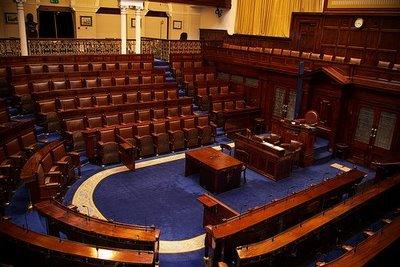Oireachtas divorced from reality

It doesn’t matter how long the Oireachtas is closed. The fact is it plays no meaningful role in our society. By Vincent Browne.
The precipitous end of the Dáil session underlines how nothing has changed in our political system, in our society, in our economy, in our public culture. Except maybe for the worse.
The Dáil has gone off for three months, aside from the occasional meetings of Oireachtas committees, which will generate appearance money for their members. Yet there is lots of legislation to debate, amend and approve/reject, were that the role of the Oireachtas. Lots of ways that the Government should be held to account, and other executive agencies held to account, if the Oireachtas had any meaningful role in doing that.
The Oireachtas could start scrutinising the insidious facet of the December budget: the broadening of the tax net to capture people previously deemed too poor to pay income tax. The Oireachtas could be examining the tax breaks, about which there was a recent report, and the departmental budgets for 2011, at the same time as the Cabinet is doing the same and, ideally, with the same information and options.
But the reality is that the Oireachtas has no meaningful role in any of these matters, matters concerning the governing of the country, the shaping of our society and the management of our economy. Almost no role at all.
For our parliament of the people’s representatives is largely irrelevant. As a forum for ventilating public anger it has a role, as Eamon Gilmore has shown. As a forum for embarrassing the Government, it plays a part too, occasionally. Sometimes Dáil questions elicit relevant information. Some of the Oireachtas committee hearings are illuminating.
But holding the Government to account? Forget it. This Government ensures this by corralling the TDs under its control into the lobbies to inure it from accountability. And as for our parliament of the people’s representatives being an autonomous legislative body, forget that too. It does what the government of the day decides, except very occasionally when, as a concession, the government yields to an opposition argument.
As Eoin O’Malley, political scientist at DCU, pointed out a few days ago, much of the talk about changing the electoral system and getting better qualified people into politics is balderdash, because it is irrelevant. We have a parliament that does not function as a parliament, and that is the problem, particularly a problem now because of the enormity of the decisions being taken by this Government, allegedly on our behalf. No scrutiny of the decisions, no meaningful participation by the representatives of the people – other than those in Cabinet, and not much by them either.
And what is depressing about this is there is a determination on the part of this Government in power not to change this, and there is a determination on the part of the government-in-waiting not to change this (while the Fine Gael reform document is interesting and welcome in many respects, it has nothing to say on the marginalisation of parliament).
What is really depressing is that the economy continues to be run to the dictates of the markets. Yesterday, the ESRI said: “Given the vulnerability of the Irish economy to the vagaries of market sentiment on our sovereign debt... it is imperative that the Government adheres to its programme of fiscal consolidation” – ie, massive cuts in public expenditure, irrespective of the social consequences, because the markets demand this.
What is tragically depressing is that there is a determination by the Government and the government-in-waiting not to change society at all. The €3bn fiscal adjustment will not involve asking those with wealth to pay for the adjustment, given that they were the ones who benefited most from the madness.
No change to the depth of inequality that prevails here – that sees so many people on the margins of society and excluded from meaningful participation in what is going on, excluded from a fair share of society’s wealth, excluded from the kind of healthcare and education the wealthy enjoy; and excluded from life itself by dying years and years earlier than the rich from all the fatal diseases. All made worse, much worse, by the tens of billions being poured and about to be poured into the banks, at massive cost to society at large.
Isn’t there something bizarre that, as a society, instead of saving our collective wealth, we spend our money, for instance, on new cars?
In the first six months of 2010 we bought 61,361 new private cars and imported another 21,712. Of the new private cars bought, 1,566 were BMWs, 232 were Lexus cars, and 1,618 were Mercedes Benzes. If we are all broke, how come 61,361 people can afford new cars? And no change to the political culture.
On television the other night, a respected RTÉ interviewer pressed Brian Cowen several times to concede we cannot deal with the competitiveness problem without cutting the minimum wage. This at a time when several RTÉ interviewers are earning well over 20 times the minimum wage.
